LSU Pivotal Football Moments
pivotal college football moment: A decision by a coach or athletic director that changes the momentum of a program or an action by a player that changes the momentum of a game.
pivotal college football moment: A decision by a coach or athletic director that changes the momentum of a program or an action by a player that changes the momentum of a game.
Tulane was looking for a new football coach for the 1915 season. Three candidates expressed interest in the job:

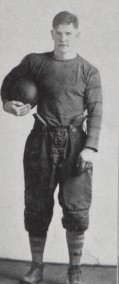
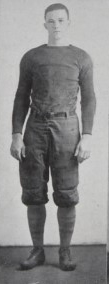
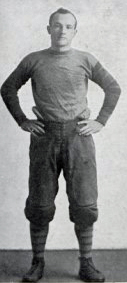
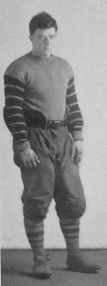
L-R: Chick "Little" Green, Alfred Reid, Bill Lewis, Lee Himes, R. H. "Tough" Walton
(Louisiana State University Gumbo Yearbook Class of 1916)
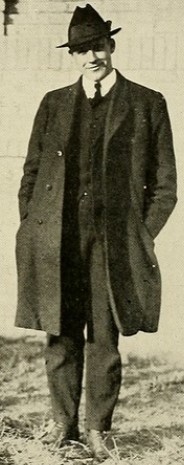


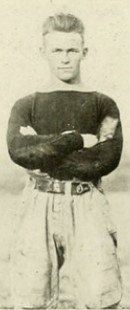
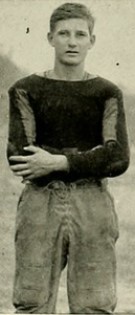
L-R: Clark Shaughnessy, Victor Rosenthal, Peter Maihles, Nick Johnston, Edmond Faust
(Tulane University Jambalaya Yearbook Class of 1916)
--Clark Shaughnessy, former Minnesota star who was a playground supervisor in Minneapolis;
--Dana X. Bible, the head coach at Mississippi College;
--Knute Rockne, track coach and assistant football coach at Notre Dame.
When Bible removed himself, it came down to Shaughnessy and Rockne, who had yet to make a name for himself nationwide. Both men were invited to come to New Orleans for an interview. Shaughnessy accepted, but Rockne asked that his meeting be pushed back a week because he had to coach his track team in the Drake relays.
When Shaughnessy arrived in New Orleans, he captivated everyone and was hired on the spot to be athletic director and coach football, basketball, and track. So Tulane sent a wire to Rockne saying not to come because the job had been filled.
Interestingly, all three men on Tulane's list would be inducted into the College Football Hall of Fame as coaches.
In his own words, Shaughnessy's first Olive and Blue team—they wouldn't become the "Green Wave" until 1920—"is green. They don't know much about football." So it was a testament to his coaching ability that they won four of their first seven games before the annual finale against LSU. The Tigers had dominated the rivalry, winning nine of the first 13 games with one tie in 1914. Shaughnessy's primary task was to make Tulane competitive against their Baton Rouge rival.
E. T. McDonald's second LSU squad entered their annual Thanksgiving Day final game with a 5-2 record.
The two teams had one common opponent, none other than Bible's Mississippi College team. LSU beat the team from Clinton MS 14-0 in Baton Rouge while Tulane lost to them 20-6 in New Orleans. (A week later, Mississippi College slaughtered Ole Miss 74-6 in Jackson.)
Rumors circulated that an LSU spy had tried to steal Tulane's signals by scouting practices with field glasses from a nearby house. But the New Orleans Item writer did not think that was feasible. "The systems are usually complicated, and it takes a man with a much more alert brain than a gridironist usually has to catch the plays the instant they are called."





L-R: Chick "Little" Green, Alfred Reid, Bill Lewis, Lee Himes, R. H. "Tough" Walton
(Louisiana State University Gumbo Yearbook Class of 1916)
LSU Gets Quick TD
Before an overflow crowd estimated at 5,000 at State Field next to the LSU campus adjacent to the state capitol, the Tigers kicked off to Victor Rosenthal, who fumbled on the Tulane 40, and LSU recovered. On the first play, Chick Green lost 3y, but Tulane was penalized 10y for holding. Two runs gained 6y to set up third down on the 23. Alfred Reid "bucked" the line for a first down. Two snaps later, Bill Lewis took the ball on "a fake play" for 12y to the 10. Tulane held Reid to 2y and stuffed Lewis for no gain. But they couldn't stop Reid from diving across the goal line to put LSU ahead 6-0. QB Himes "missed a difficult goal" because the rules of the day called for attempting the extra point kick from the point where the player scoring the touchdown crossed the goal line. LSU 6 Tulane 0
Tulane claimed the touchdown was not a touchdown, and both sides complained about the three officials throughout the contest.





L-R: Clark Shaughnessy, Victor Rosenthal, Peter Maihles, Nick Johnston, Edmond Faust
(Tulane University Jambalaya Yearbook Class of 1916)
Tigers Double Their Lead
Early in the second quarter, Reid and Lewis took turns running the ball until "the redhead halfback" scored over left tackle. The extra point try failed again. LSU 12 Tulane 0
One New Orleans writer wrote, "Like a hot knife going through melted butter, the Louisiana Tigers romped merrily through the Tulane eleven ... and registered two tallies before the Olive and Blue gridironists awoke to a realization of what they were on the field for. And when they did find out—they played as good football—and better—than the upstaters, but the opportunity and the game were gone forever."
Tulane was driving toward a touchdown when Tulane's captain Peter Maihles was assessed a slugging penalty that cost them 15y and sent hm to the bench for good. Later, another of Tulane's best players, Nick Johnston, was ejected for the same offense along with LSU's G R. H. "Tough" Walton. On another occasion, Himes intercepted a pass on the LSU five to thwart a Tulane drive.
The Olive and Blue recovered three fumbles in the second half but could not turn the breaks into points.
Twice Tulane, using the Minnesota shift right before the ball was snapped, appeared to have good interference on end runs, but E Freddie Krementz from Baton Rouge High, playing the entire game without a substitute, "sifted in, bored through, and nailed his man twice behind the line of scrimmage." LSU's Green intercepted three passes to help keep the visitors from removing the goose egg next to "Tulane" on the scoreboard.
In the second half, Edmond Faust, "the heaviest man in the Tulane backfield at 138 pounds, tore through the heavy Tiger defense time and again" to make tackles and help keep LSU from adding to their lead.
FINAL SCORE: LSU 12 TULANE 0
References
The Green Wave: Tulane University Football, George Sweeney (1980)
The Fighting Tigers II: LSU Football, 1893-1980, Peter Finney (Revised edition 1980)
The Green Wave: Tulane University Football, George Sweeney (1980)
The Fighting Tigers II: LSU Football, 1893-1980, Peter Finney (Revised edition 1980)